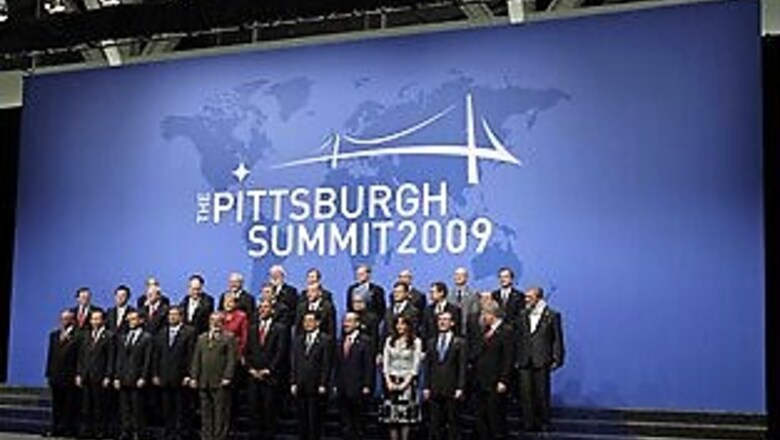
views
Pittsburgh: For the world, apparently, eight is no longer enough.
The G-8 group of powerhouse economies, which expanded from the original G-5 one by one over three decades, stepped off center stage as its annual summit ended on Friday, while the G-20 ascended into the role of overseeing the global economy. Henceforth, the council of 20 major economies will steer the planetary fiscal ship through its choppiest waters in a generation.
The shift toward multilateral decision-making is sure to please some emerging economies--China and India in particular--and irritate those Americans who believe the United States shouldn't be handing off its power to international institutions. No matter that the groups lack any regulatory or administrative power other than the collective oomph of their members.
The ascension of a broad-based body like the G-20 represents a growing global consensus that an international alignment firmly in place since the mid-1970s no longer suffices on a planet where fast-rising powers insist upon places at the table.
"Dramatic changes in the world economy have not always been reflected in the global architecture for economic cooperation," the White House said on Thursday night in announcing that the G-20 would become the essential global economic council. "This decision brings to the table the countries needed to build a stronger, more balanced global economy."
That's one way of looking at it. But as with most economic issues, it's not just about money. It's about power and access--not unlike the debate over whether to expand the U.N. Security Council.
The big Gs of history
Sprung from the 1973 oil crisis and its aftereffects, the original G-5 was formed as a tight union of industrialized democracies--originally the United States, Britain, France, West Germany, Japan. France pushed for the addition of Italy, the United States invited Canada in and Russia signed on in 1997.
Then, in the early part of this decade--shortly after the separate G-20 finance ministers began meeting in 1999--the G-8 began to bring other nations into discussions. But China and India, with cultures that date back many centuries, didn't exactly appreciate the notion of being anyone's little brother in the 21st.
Thus the announcement Thursday that the larger G-20 would take over--a council that, by simple virtue of a membership that unites more than 80 percent of the global economy, is a force to be reckoned with. "The G-20 format has proven itself in times of crisis," German Chancellor Angela Merkel said Friday. President Barack Obama called it "the most diverse collection of leaders in history."
China, not unexpectedly, welcomed the expansion to a club that would finally have it as a member. On Friday, Vice Foreign Minister He Yafei said the G-20 should be the main conduit for dealing with global financial and economic matters because the G-8 "lacks wide representation."
"The G-20 has the vitality and can represent the views of various countries in a balanced way," He said.
It also has the benefit of de-emphasizing the core group of the G-8--which, in strategic terms, also means de-emphasizing the 20th-century colonial powers of Britain, France, Germany and to some extent the United States.
PAGE_BREAK
That's an important message that emerging economies want to hear. But it also means that, by sitting down with the big boys, they have to talk in the common vocabulary of continually growing capitalism, which does not always fit every nation's political message.
"If the old colonial masters have deigned to recognize their old subjects and include them as equals at the table, the old subjects have also given up the feelings that they had to be different in order to have integrity. They've adopted the ways of their old masters," said Jeffrey Martinson, a political scientist and foreign policy analyst at Meredith College in North Carolina.
Why a G20
In some obvious ways, a larger council makes sense. People who might not get along well can find common ground on economic goals. The increasing focus on environmental concerns might play out better with China, Brazil and India at the table. A wider economic discussion fits better in an era when huge amounts of capital move around with the click of a mouse.
Yet some are wary of potential pitfalls. More democratic usually means more unwieldy, so will a group of 20 be able to get anything done? Will endless discussion and finessing replace decisive action by the world's primary economic stakeholders? Can economic policy really be decided with only one African nation represented and Switzerland absent?
"To me, it's not yet clear how this is going to work," said Michael Klosson, a Clinton-era State Department official who is now chief policy officer for Save the Children. "We're concerned that this national commitment to development-- one that we've seen at recent G-8 summits--is going to evaporate. We want to hear that development is squarely on the agenda for the G-20."
Peter Morici, a former chief economist at the US International Trade Commission who now teaches at the University of Maryland, dismisses the move as an obvious American ploy to appease China and try to use international institutions to solve bilateral problems. Emphasis on the larger G-20, he says, "actually makes things worse."
"This is an American president basically surrendering economic policy to an international institution," Morici said.
The creation of what is, in some respects, an economic United Nations certainly adds voices to the mix--voices that, in some cases, have struggled mightily to be heard over the bullhorns of the traditional powers. And yet, in a new world of information where everyone demands a say, even 20 may not be enough, either--at least to hear Egypt tell it.
Its foreign minister, Ahmet Aboul Gheit, said on the sidelines of the U.N. General Assembly that "countries that are considered important players" need seats at the G-20 table, too. "Listen to us. Listen to the rest of the world," he said. "Do not turn it into a closed club as it was with the G-8."


















Comments
0 comment